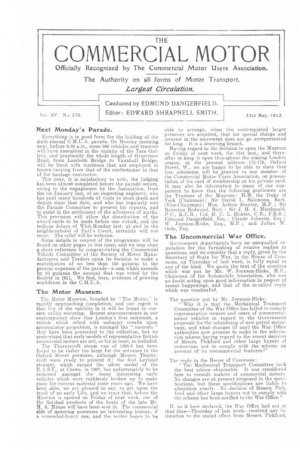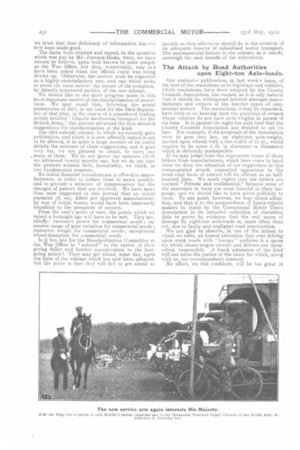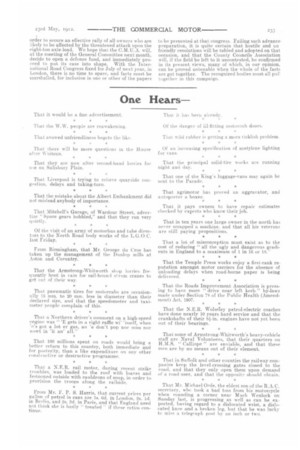Next Monday's Parade.
Page 1

Page 2

Page 3

If you've noticed an error in this article please click here to report it so we can fix it.
Everything is in good form for the holding of the sixth annual C.M.U.A. parade. On Monday morning next, before 9.30 a.m., some 300 vehicles and tractors will have assembled in the vicinity of the Tate Gallery, and practically the whole length of Grosvenor Road, from Lambeth Bridge to Vauxhall Bridge, will be lined with machines that are employed in trades varying from that of the confectioner to that of the haulage contractor.
This year, it is satisfactory to note, the judging has been almost completed before the parade occurs, owing to the engagement by the Association, from the 1st January last, of an inspecting engineer, who has paid many hundreds of visits to store-sheds and depots since that date, and who has regularly met the Parade Committee to present his reports, and to assist in the settlement of the allotment of marks. This prevision will allow the distribution of the award-cards to be made before one o'clock, and the tedious delays of Whit-Monday last, at and in the neighbourhood of Earl's Court, certainly will not recur, The relief will be welcome.
Some details in respect of the programme will be found on other pages in this issue, and we may close a short reference by congratulating the Commercial Vehicle Committee of the Society of Motor Manufacturers and Traders upon its decision to make a contribution of no less than 150 guineas to the general expenses of the parade—a sum which exceeds by 50 guineas the amount that was voted by the Society in 1911. We find, here, evidence of growing confidence in the C.M.U.A.
The Motor Museum.
The Motor Museum, founded by " The Motor," is rapidly approaching completion, and our regret is that few of the exhibits in it will be found to concern utility motoring. Recent announcements in our contemporary show that London's first motoreab, a vehicle which relied with unhappy results upon accumulator propulsion, is amongst the " ancients " that have been presented to the collection, but we understand that early models of representative British commercial motors are not, so far at least, so included.
The Thornycroft steam van of 1895-6 has been found to be rather too large for the entrance to the Oxford Street premises, although Messrs. Thornycroft were ready to present it : the first Leyland steamer, which earned the silver medal of the BASE.. at Crewe, in 1897, has unfortunately to be reckoned amongst the many interesting early vehicles which were ruthlessly broken up to make room for current material some years ago. We have been able, we are pleased to say, to get upon the track of an early Lift:, and we trust that, before the Museum is opened on Friday of next week, one of the finished products of the brain of the late Mr. H. A. House will have been sent in. The commercial side of motoring possesses an interesting history, if a somewhat-heavy one, and the writer hopes to be able to arrange, when the contemplated larger premises. are acquired, that his special charge and interest in the movement does not go unrepresented tor long. It is a deserving branch.
Having regard to the decision to open the Museum on Friday of next week, the 31st inst., and thereafter to keep it open throughout the coming London season, at the present address-175-179, Oxford Street, W., we are happy to be able to state that free admission will be granted to any member of the Commercial Motor Users Association, on presentation of his card of membership or his private card. It may also be information to many of our supporters to know that the following gentlemen are the Trustees of the Museum : FIJI. the Duke of Teck (Chairman); Sir David L. Salomons, Bart. (Vice-Chairman); Hon. Arthur Stanley, M.P. ; Sir Boverton Redwood, Bart. ; Sir J. H. A. Macdonald, P.C., K.C.B. ; Col. H. C. L. Holden, C.B., F.R.S. ; Edmund Dangerfield, Esq.; Claude Johnson, Esq. ; W. Joynson-FI As, Esq., M.P. ; and Julian W. Orde, Esq.
The Uncommercial War Office.
Government departments have an unequalled reputation for the furnishing of evasive replies to questions, and we consider that a reply, given by the Secretary of State for 'War, in the House of Commons, on Thursday of last week, is fully equal to any of the kind. We quote the text of the question which was put by Mr. W. Joynson-Hicks, M.P., Chairman of the Automobile Association, who was no doubt acting upon good information in respect of recent happenings, and that of the so-called reply which was vouchsafed.
The question put by Mr. joynson-Hicks
" Why it is that the Mechanical Transport Committee of the War Office has failed to consult representative owners and users of commercialmotor vehicles in regard to the Government proposals for the subsidising of new petrol motorvans, and what changes (if any) the War Office authorities now propose to make in the subvention scheme having regard to the recent decision of Messrs. Pickford and other large buyers of motorvans not to comply with the scheme on account of its uncommercial features?"
The reply in the House of Commons : " The Mechanical Transport Committee took the best advice obtainable. It was considered best to consult makers of commercial motors. No changes are at present. proposed in the specifications, but these specifications are liable to alteration yearly. No decision of Messrs. Pickford and other large buyers not to comply with the scheme has been notified to the War Office."
If, as it here declared, the War Office had not at that time—Thursday of last week--received any intimation to the stated effect from Messrs. Pickford, we trust that that deficiency of information has ere now been made good.
The facts, both implied and stated, in the question which was put by Mr. Joynson-Hicks, were, we Jim e reason to believe, quite well known to some people at the War Office, but they, conceivably, may nct have been asked when the official reply was being drawn up. Otherwise, the answer must be regarded as a highly-unsatisfactory one, and one which seeks to avoid the issue raised—the nature of the reception, by directly-interested parties, of the new scheme. We should like to see more progress made in this most-important matter of the standardization of motorvans. We may recall that, following the grand manceuvres of 1910, in our issue for the 22nd September of that year, in the course of a considered leading article entitled Chaotic mechanical transport for the British Army," this journal advanced the first detailed suggestions for standardization of the kind.
The 1912 subsidy scheme, to which we recently gave publication, and which it is now officially stated is not to be altered, is in quite a large number of its useful details the outcome of those suggestions, and it goes very far, we are pleased to admit, to carry out , many of them. We do not ignore the opinions which we advanced twenty months ago, but we do say that the present scheme fails, lamentably, we think, in two fundamental respects. No initial financial consideration is offered to manufacturers, in order to induce them to move quickly, and to provide a measure of compensation for the changes of pattern that are involved. We have more than once suggested in this journal that an initial payment of, say, 22000 per approved manufacturer, by way of initial bonus, would have been immensely beneficial to the prospects of success. From the user's point of view, the points which we raised a fortnight ago will have to be met. They are, chiefly : excessive power for commercial needs ; excessive range of gear variation for commercial needs ; excessive weight for commercial needs ; exceptional wheel-diameters for commercial needs.
Is it too late for the Standardization Committee at the War Office to " unbend " to the extent of their giving fuller and further consideration to the foregoing points ? They may get ahead, some day, upon the lines of the scheme which has now been adopted, hut the point is that they will fail to get ahead so quickly as they otherwise should do in the creation of an adequate reserve of subsidized motor transport,. The uncommercial factors in the scheme, as it stands, outweigh the cash benefit. of the subvention.
The Attack by Road Authorities upon Eight-ton Axle-loads.
Our exclusive publication' in last week's issue of the text of the resolutions as to highways and vehicles, which resolutions have been adopted by the County Councils Association, has roused, as it is only natural that it should do, widespread interest amongst manufacturers and owners of the heavier types of commercial motors. The resolutions, it may be remarked, have little or no bearing upon the practices of owners whose vehicles do not have axle-weights in excess of six tons. It is against the eight-ton axle-load that the County Councils Association has decided to set its face. For example, if the proposals of the Association were to pass into law, an eight-ton axle-weight, carried upon wheels with a tire-width of 11 in., would require to be some 5 ft. in diameter—a dimension which is obviously inadmissible.
If we may judge from the imperative terms of three letters from manufacturers, which have come to hand since we drew the attention of our supporters to this contemplated attack, concerted opposition to the weak-road basis of control will be offered on no halfhearted lines. We much regret that the letters are marked "Private and confidential," because some of the sentences in them are most forceful in their language, and we should like to have given publicity to them. To one point, however, we may direct attention and that is to the preparedness ol heavy-vehicle makers to stand by the Commercial Motor Users Association in its intended collection of statistical data to prove by evidence that the real cause of damage by eight-ton axle-loads is, more often than not, due to faulty and negligent road construction.
We are glad to observe, in one of the letters to which we refer, an honest admission that over-driving upon weak roads with " bumpy" surfaces is a cause for which steam-wagon owners and drivers are themselves responsible. A frank admission of the kind will not harm the justice of the cause for which, along with us, our correspondents contend.
No effort, we feel confident, will be too great in order to secure an effective rally of all owners who are likely to be affected by the threatened attack upon the eight-ton axle-load. We hope that the C.M.U. A. will, at the meeting of the General Committee next month, decide to open a defence fund, and immediately proceed to put its case into shape. With the International Road Congress fixed for July of next year, in London, there is no time to spare, and facts must be marshalled, for inclusion in one or other of the papers to be presented at that congress. Failing such advancepreparation, it is quite certain that hostile and ac friendly resolutions will be tabled and adopted on that occasion, and that the County Councils Association will, if the field be left to it uncontested, be confirmed in its present views, many of which, in our opinion, can be proved untenable when the whole of the facts are got together. The recognized bodies must all pull together in this campaign.






















